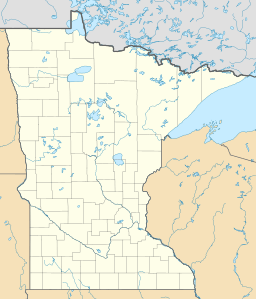Freeborn Lake facts for kids
Quick facts for kids Freeborn Lake |
|
|---|---|
| Location | Douglas County, Minnesota |
| Coordinates | 45°47′40″N 95°37′2″W / 45.79444°N 95.61722°W |
| Type | lake |
Freeborn Lake is a beautiful lake located in Douglas County, Minnesota, in the U.S. state of Minnesota. This natural body of water is a part of the many lakes that make Minnesota famous. It offers a peaceful spot for both nature and history lovers.
Freeborn Lake got its name from an early settler. A pioneer named John Freeborn arrived in the area in 1868. The community decided to name the lake after him to honor his contributions. This is a common way many places in the United States get their names.
Contents
What is a Lake?
A lake is a large body of water surrounded by land. Lakes are not connected to the ocean, unlike seas. They are usually fed by rivers, streams, or rainfall. Lakes can be found all over the world. They vary greatly in size, depth, and how they were formed.
How Lakes are Formed
Lakes can form in many different ways. Some are created by glaciers, which are huge sheets of ice. As glaciers move, they carve out hollows in the land. When the ice melts, these hollows fill with water. Other lakes form in volcanic craters or from movements in the Earth's crust.
- Glacial Lakes: Many lakes in Minnesota, including Freeborn Lake, were formed by glaciers.
- Tectonic Lakes: These form when parts of the Earth's crust move and create depressions.
- Volcanic Lakes: These are found in the craters of inactive volcanoes.
- Oxbow Lakes: These form when a bend in a river gets cut off from the main flow.
Importance of Lakes
Lakes like Freeborn Lake are very important for many reasons. They provide homes for many plants and animals. They also offer places for people to enjoy outdoor activities.
- Habitat: Lakes are home to fish, birds, insects, and many types of plants.
- Water Supply: Many cities and towns get their drinking water from lakes.
- Recreation: People love to swim, fish, boat, and kayak in lakes.
- Climate Regulation: Large lakes can affect the local weather patterns.
Life in Freeborn Lake
Lakes are bustling ecosystems. An ecosystem is a community of living things interacting with their environment. Freeborn Lake, like other lakes, supports a variety of life.
Aquatic Plants
Many types of plants grow in and around lakes. These plants are important for the lake's health. They provide food and shelter for animals. They also help keep the water clean.
- Submerged Plants: These plants grow completely underwater.
- Emergent Plants: These plants have roots in the water but grow above the surface.
- Floating Plants: These plants float on the water's surface.
Fish and Other Animals
Freeborn Lake is likely home to various fish species. Common fish in Minnesota lakes include walleye, northern pike, and bass. These fish are part of a food web. Smaller creatures like insects and tiny organisms also live in the lake. Birds often visit lakes to find food. You might see ducks, geese, or even eagles near the water.
Enjoying Freeborn Lake
Lakes are wonderful places for outdoor fun. Freeborn Lake offers opportunities for people to connect with nature.
Popular Activities
Many people visit lakes for different activities. These activities help people relax and enjoy the outdoors.
- Fishing: Anglers enjoy trying to catch fish like walleye or bass.
- Boating: Kayaks, canoes, and small boats are popular on lakes.
- Swimming: On warm days, swimming is a favorite way to cool off.
- Wildlife Watching: Observing birds and other animals is a peaceful activity.
Protecting Our Lakes
It is very important to protect lakes like Freeborn Lake. Keeping lakes clean helps both wildlife and people. Pollution can harm the plants and animals that live there. It can also make the water unsafe for swimming or drinking.
- Reduce Pollution: Avoid littering and properly dispose of waste.
- Conserve Water: Using less water helps maintain lake levels.
- Respect Wildlife: Do not disturb animals or their habitats.
- Support Conservation: Learn about and support groups that protect lakes.
By taking care of our lakes, we ensure they remain beautiful and healthy for future generations.


